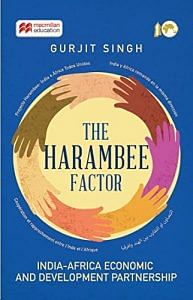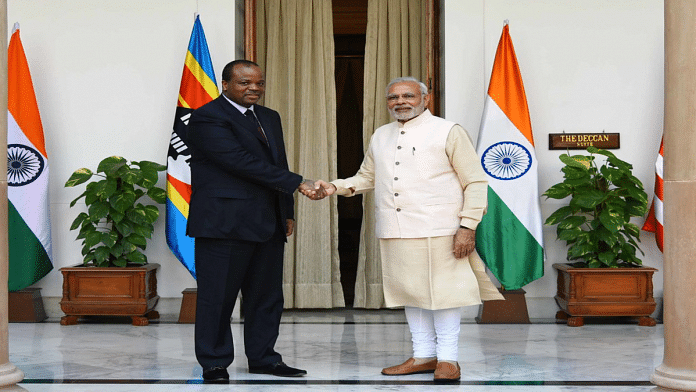In South Africa for the BRICS Summit, Prime Minister Modi had a bilateral meeting with the South African President and attended the BRICS Summit and other Summit-related meetings. Three MoUs were signed bilaterally on agricultural research, setting up the Gandhi Mandela Centre for Specialization of Artisan Skills in South Africa and also one for space cooperation.
Thus, it can be seen that the intensification of the high-level visits to African countries saw the Indian approach being implemented in fuller measure at each visit. While the PM visits received more coverage, the elements embedded in the Indian approach were manifest in the results and offers made during the visits by the President and Vice President too.
Another major alteration to the traditional policy approach towards Africa, was the decision to rapidly expand India’s diplomatic presence in Africa. The expansion from the largely English-speaking countries of south, east and west Africa slowly occurred with gaps plugged through the opening of new missions in places like Malawi (the Indian Mission opened there in 1964 and was closed in 1993. It reopened in 2012), Mali (May 2009) and Niger (May 2009). However, never before had such a massive push for diplomatic expansion in Africa taken place.
In March 2018, the Cabinet approved the proposal to establish 18 new resident Missions in African countries. These were gradually implemented over a four-year period from 2018 to 2021. The new Missions are in Burkina Faso, Cameroon, Cape Verde, Chad, Republic of the Congo, Djibouti, Equatorial Guinea, Eritrea, Guinea, Guinea-Bissau, Liberia, Mauritania, Rwanda, Saô Tomé and Príncipe, Sierra Leone, Somalia, Swaziland and Togo. These will enhance the number of resident Indian Missions in Africa from 29 to 47.
Nine among these new missions would be in West Africa, four in Central Africa, one in the well-covered South, and two in the East and Somalia and Djibouti, on the eastern coast facing the Indian Ocean are part of the North Africa-Arab League bloc. After this expansion Indian missions will be absent only from Burundi, Comoros, Lesotho, Gabon, Gambia and Central African Republic. Interestingly, four of the new missions would open in countries visited recently by the President or Vice President, that is, Djibouti, Guinea, Rwanda and Sierra Leone. Comoros (covered from Madagascar) and Gambia (covered from Senegal), which had received high-level visits, remain without proposed new Indian missions. This expansion of missions will not be from the existing human resources of the MEA but are likely to bring with them additional posts amounting to about 70 over four years.
Also read: Ultimate ‘sting op’ — how Indian scientists imported wasps from Africa to tackle an alien pest
Changes within the MEA also gave a focus to Africa. In 2002, the sole Africa division which covered all of sub-Saharan Africa was divided into two with one looking after east and southern Africa and the other attending to central and west Africa. The West Asia and North Africa divisions looked at the countries through the prism of the Arab League and the assessment remained separate, even though east African countries like Sudan, Somalia and Djibouti are part of it. In 2015, the Africa portfolio was transferred from the Secretary (West) to the Secretary (Economic Relations) who also oversaw the Development Partnership Administration from which much of the impact on Africa was made. In January 2020, there was further change with an Additional Secretary appointed to oversee Africa, and then relate to the respective secretaries. Similarly, an Additional Secretary had been appointed in 2012 to oversee the Development Partnership Divisions under the Secretary ER. However, these were not consistent policies.
During PM Modi’s visit to Uganda, his address to the Parliament of Uganda was of great significance. He enunciated the ten guiding principles for India’s Africa engagement. This template discussed, for the very first time, what would guide India’s engagement with Africa at all levels. It showed that the Modi government was now ready to enunciate clear guidelines for its policy with Africa. In the Shangri La dialogue a month earlier, in June 2018, the PM similarly stated India’s policy for the Indian Ocean. These principles emanated from the history of India’s engagement with Africa, while simultaneously upholding the IAFS summit documents, even while updating them with contemporary realities.
The following principles were declared at the Ugandan Parliament on 25 July 2018:
- Africa will be at the top of our priorities. We will continue to intensify and deepen our engagement with Africa. As we have shown, it will be sustained and regular.
- Our development partnership will be guided by your priorities. We will build as much local capacity and create local opportunities as possible. It will be on terms that are comfortable to you, that will liberate your potential and not constrain your future.
- We will keep our markets open and make it easier and more attractive to trade with India. We will support our industry to invest in Africa.
- We will harness India’s experience with the digital revolution to support Africa’s development; improve delivery of public services; extend education and health; spread digital literacy; expand financial inclusion; and mainstream the marginalised.
- Africa has 60 per cent of the world’s arable land, but produces just 10 per cent of the global output. We will work with you to improve Africa’s agriculture.
- Our partnership will address the challenges of climate change.
- We will strengthen our cooperation and mutual capabilities in combating terrorism and extremism; keeping our cyberspace safe and secure; and supporting the UN in advancing and keeping peace.
- We will work with African nations to keep the oceans open and free for the benefit of all nations. The world needs cooperation and competition in the eastern shores of Africa and the eastern Indian Ocean.
- As global engagement in Africa increases, we must all work together to ensure that Africa does not, once again, turn into a theatre of rival ambitions, but becomes a nursery for the aspirations of Africa’s youth.
- Just as India and Africa fought colonialism together, we will work together for a just, representative and democratic global order that has a voice for one-third of humanity that lives in Africa and India.
These ten principles exhibited the evolution of India’s partnership with Africa, which is based on a model of cooperation responsive to the needs of African countries. It is demand-driven and free of conditionalities. It is based on our history of friendship, historical ties and a sense of deep solidarity.
It is worthwhile to track the recent activities and implementation of these various ideas under each of the principles governing India’s Africa policy and see that the assertion was in fact matched by commitment and resolve to establish a more contemporary partnership.
Also read: Who gets what, will it measure up — the complexities of colonialism reparations & compensations
Africa certainly appears to be on high priority for India. The promise in the Principle 1 of regularity and certainty has been maintained. Since 2014, there has been unprecedented intensification of our political engagement with Africa, with visits to African countries by the President, Vice President and Prime Minister apart from ministerial visits to every African country. The visits have been in both directions. Subsequent to the IAFS-III, India hosted over 35 leaders from Africa for various events between 2014 and 2019. The President of South Africa, Cyril Ramaphosa was the Chief Guest at the Republic Day celebrations in January 2019. The President and Vice President started their terms with early visits to African countries.
Prime Minister Modi visited several African countries, in 2016 and 2018 as discussed earlier. The calls made by PM Modi to African leaders including the AU Chair, South African President Ramaphosa, in April 2020 to discuss the Covid-19 pandemic and its impact were part of this paradigm. The EAM Dr Jaishanker had several calls with his African counterparts to also discuss the situation emanating from Covid-19, indicating the high priority accorded to Africa.
 This excerpt from ‘The Harambee Factor’ by Gurjit Singh has been published with permission from Macmillan Publishers India.
This excerpt from ‘The Harambee Factor’ by Gurjit Singh has been published with permission from Macmillan Publishers India.



